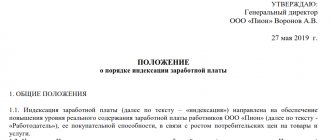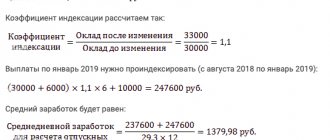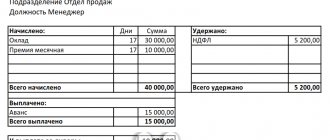Compensation for delayed payment of wages under the Labor Code of the Russian Federation
In times of crisis, many Russian companies, often small businesses, are increasingly delaying wages (hereinafter referred to as wages) to their employees.
In most cases, this is not the fault of the company: each of them is a link in a dependent chain of counterparties. Consequently, as soon as payment interruptions (payment under contracts from customers/purchasers are not received on time) occur in one link, this automatically affects all subsequent ones. As a result, this may lead to the fact that employees of one, or perhaps several levels, will not receive salaries on time. If this happens and the employees do not receive the wages due to them on time, then the employing company will subsequently be obliged to pay the employees not only their wages, but also compensation (which in its content represents interest on late payments). This is stated in Art. 236 Labor Code of the Russian Federation.
IMPORTANT! Failure to pay wages on time, among other things, gives the employee the right to temporarily suspend the performance of his labor functions, as well as apply for compensation for moral damage (Articles 142, 237 of the Labor Code of the Russian Federation).
Compensation for late payment of wages is accrued from the day following the established payment deadline until the day the employer repays the debt to employees, inclusive.
Example 1
If the salary, for example, was supposed to be paid on the 5th, but was actually paid on the 12th, then the compensation will be calculated for 7 days (from the 6th to the 12th inclusive).
If a delay did occur, the employing company will have to pay the employee appropriate compensation, regardless of whether it is directly to blame for the delay in the salary or not.
NOTE! Today, the situation is especially relevant when, due to the revocation of the license, the bank did not transfer the salary to the employees of the organization - the payroll client. This circumstance does not relieve the employer of the risk of falling under Art. 236 of the Labor Code of the Russian Federation, since the fact of guilt does not matter. Therefore, in order to minimize this risk, the company should more carefully select a bank for its salary project.
Moreover, if, for example, the bank is to blame for the delay (in particular, it did not fulfill the payment order of the client organization on time to transfer the salary to employees), then the company should remember that it has the right to make a recourse claim to the bank for the fact that it did not timely transferred the salary to the employees, which means he violated the terms of the salary project with the company. However, you will still need to pay workers' compensation first.
Calculation of monetary compensation for delayed wages
The Labor Code of the Russian Federation does not establish in what specific amount the company must pay compensation to employees for delays in wages. The legislator gave organizations the right to independently determine this in a collective agreement.
At the same time, the lower limit of compensation has been determined - not less than 1/150 of the key rate for the period of delay in the salary, calculated for each day of delay:
MRK = ZPnach × Kl.St. / 150 × Dpr,
where: MRK is the minimum that the employer is obliged to pay to the employee for a delay in salary;
ZPnach - the amount of wages that should have been paid to the employee on a strictly established day (minus personal income tax);
Class.St. — refinancing rate (key rate) of the Central Bank of the Russian Federation for the period of delay;
DPR - the number of days for which the employer was late in paying employees wages.
In the collective agreement, the company can only increase the amount of compensation for delay; the organization does not have the right to set it in a smaller amount than according to the above formula.
Example 2
Salary in the company is paid, according to the collective agreement, on the 5th (for the second half of the previous month) and the 20th (for the first half of the current month) of the month. The collective agreement does not contain special provisions regarding compensation for late wages.
For the first half of February, the employee was accrued salary in the amount of 30,000 rubles. However, it was actually paid only on March 6.
The refinancing rate in force during the period under review (conditionally) was 7.5%.
Under these conditions, the organization should pay the employee on March 6, in addition to the salary, also compensation for delay for 15 calendar days in the minimum amount:
MRC = 30,000 × (100% – 13%) × 7.5% / 150 × 15 = 195.75 (rub.)
However, it is not enough to simply correctly calculate the amount of compensation for late salary payments. It is also important for an organization to clearly know whether personal income tax should be withheld from such compensation, whether insurance premiums should be charged and paid for such an amount, and what to do with expenses for profit tax purposes.
Formula for calculating compensation
Two formulas are used for the calculation.
One of them allows you to calculate compensation at the Central Bank refinancing rate. The other is based on the coefficient specified in the employment contract. If the refinance rate is used, the formula is as follows:
Compensation = salary * 1/150 * Central Bank refinancing rate * number of days of delay.
If the contract specifies a coefficient (usually it is indicated as a percentage), the calculation is carried out using the following formula:
Compensation = salary * coefficient in % * number of days of delay.
Personal income tax on compensation for late payment of wages
On the one hand, the Tax Code of the Russian Federation establishes that it is not necessary to pay personal income tax to the budget on compensation if it must be paid to an employee due, in particular, to the performance of labor functions in the company (clause 3 of Article 217 of the Tax Code of the Russian Federation).
On the other hand, the Labor Code of the Russian Federation limits the scope for establishing a specific amount of compensation to a minimum limit. The upper limit is not standardized. Consequently, the employer can set arbitrarily high compensation by fixing it in the collective agreement.
The question arises: will the amount of compensation be subject to personal income tax (both in terms of the minimum and in terms of exceeding the minimum under the Labor Code of the Russian Federation)?
Regarding the minimum amount of compensation, the answer is transparent: it will not be subject to personal income tax. This has been confirmed more than once by the regulatory authorities in their explanations (letters of the Federal Tax Service of the Russian Federation dated 06/04/2013 No. ED-4-3 / [email protected] , Ministry of Finance of the Russian Federation dated 02/28/2017 No. 03-04-05/11096, 01/23/2013 No. 03- 04-05/4-54, etc.).
In the case of exceeding the minimum allowable amount, controllers take a similar position: the amount of excess is not subject to personal income tax, but only if such excess is consistent with an employment or collective agreement (letter of the Ministry of Finance of the Russian Federation dated November 28, 2008 No. 03-04-05-01/450, dated 06.08 .2007 No. 03-04-05-01/261).
NOTE! If a company abuses this exemption and, under the guise of compensation, pays, for example, the salary itself to employees, then this is fraught with disputes with inspectors and additional personal income tax amounts being assessed during the inspection. In this case, the court will most likely side with the inspectors, since content has priority over form: regular payments of compensation in an amount significantly exceeding the amount of wages accrued to employees prove that wages were actually paid. This means that it is necessary to pay personal income tax (resolution of the Federal Antimonopoly Service of the Ural District dated November 30, 2012 No. F09-11655/12 in case No. A60-7589/2012).
Whether it is necessary to accrue personal income tax when paying other compensation payments, read the materials in the section “Compensation and personal income tax” .
Regulatory base for salary compensation
Art. obliges employers to pay employees wages on time. 21 Labor Code and Art. 37 of the Constitution. The list of obligations includes:
- Accrual and payment of salaries twice a month (with strict adherence to deadlines).
- Payment of compensation in case of delay in salary.
- Compensation for delays in any accruals, including severance pay, vacation pay, etc.
- Informing employees about the amount of compensation.
The exact amount of TC compensation has not been established. It fixes only the minimum threshold for a day of delay - 1/150 of salary * the current Central Bank refinancing rate. The employer has the right to pay the minimum compensation, unless otherwise specified in the employment contract with the employee.
Insurance premiums for payment of compensation for late wages
If a company pays personal income tax as a tax agent, that is, at the expense of an employee, then the burden of insurance premiums falls directly on the organization.
So, is interest on late payments subject to insurance premiums? There are two points of view on this issue.
One is that amounts of monetary compensation for violation by the employer of the established payment deadline are not subject to inclusion in the base for calculating insurance premiums. This conclusion was reached, for example, by the judges of the Arbitration Court of the Far Eastern District dated December 21, 2017 No. F03-4860/2017 in case No. A73-2697/2017 (the decision of the Supreme Court of the Russian Federation dated May 7, 2018 No. 303-KG18-4287 refused to transfer the case to the court Collegium for Economic Disputes).
The arbitrators motivated their decision by the fact that compensation for late payment of wages is not remuneration, but a type of financial liability of the employer to the employee, which is paid by force of law to an individual in connection with the performance of his labor duties, providing additional protection of the employee’s labor rights. For this reason, compensation for late payment of wages is not subject to insurance contributions on the basis of subclause. “and” clause 2, part 1, art. 9 of Law No. 212-FZ (since January 1, 2017, similar provisions are given in paragraph 2 of Article 422 of the Tax Code of the Russian Federation).
See also “Compensation for non-payment of wages on time: contributions”.
Another point of view is that the types of payments not subject to insurance premiums are listed in Art. 422 of the Tax Code of the Russian Federation. Compensation for late payment of wages in Art. 422 of the Tax Code of the Russian Federation is not given, therefore, contributions must be calculated from this payment. This position is adhered to by the Ministry of Finance of the Russian Federation in letter dated March 21, 2017 No. 03-15-06/16239.
As you can see, this issue is controversial. And it's up to you to decide.
Where does the calculation of compensation begin?
Before calculating compensation, it is necessary to find out whose fault the delay in payment was.
If the employer is at fault, compensation is assessed and paid. If the employee himself - no. The latter case includes situations where employees do not provide bank card information on time or do not report to the accounting department (if the company makes cash payments). So, the employer is to blame for the delay. The inputs for calculating compensation will be:
- The exact date of payment of wages (from this date the arrears are calculated).
- Number of days overdue.
- The Central Bank rate for calculating compensation or the coefficient specified in the contract.
Another important point. The number of days of delay is calculated using the calendar method (including weekends).
Accounting for compensation for late wages in income tax expenses
Regarding income tax, the situation is somewhat more complicated. The Tax Code of the Russian Federation does not contain any provisions regarding whether such compensation can be taken into account as expenses or not.
The code only says that a company can include in its expenses compensation, the payment of which to employees is related to any working conditions (Article 255 of the Tax Code of the Russian Federation).
In addition, paragraph 13 of Art. 265 of the Tax Code of the Russian Federation allows sanctions for violation of contracts to be taken into account in expenses. However, no restrictions or sanctions have been established. There are also no special conditions regarding whether this rule applies only to civil contracts or to employment contracts as well.
Therefore, on the one hand, it is possible to consider compensation for the delay of the PO as a sanction and take it into account as part of the expenses. Previously, the courts agreed with this logic (resolutions of the Federal Antimonopoly Service of the Volga District dated August 30, 2010 in case No. A55-35672/2009).
At the same time, later the regulatory authorities took the position that such compensation cannot be included in expenses, since it is not related to working conditions (Article 255 of the Tax Code of the Russian Federation does not apply), and the norms of Art. 265 of the Tax Code of the Russian Federation does not apply to this compensation (letter of the Ministry of Finance of the Russian Federation dated October 31, 2011 No. 03-03-06/2/164).
Therefore, today it is quite risky to take into account compensation for delays in salary payments in expenses.
ConsultantPlus experts examined three points of view on this issue and presented arguments from officials and arbitrators in defense of each. If you do not have access to K+, get trial online access for free and go to the Encyclopedia of Disputed Situations on Income Tax.
simplified tax system
If an organization applies a simplification with the object of taxation being income, do not take into account compensation for delayed wages when calculating the single tax (clause 1 of Article 346.14 of the Tax Code of the Russian Federation).
Situation: is it possible to take into account the amount of compensation for delayed payment of wages as part of labor costs? The organization applies a simplification; it pays a single tax on the difference between income and expenses.
No you can not.
An organization can reduce the income received by paying for labor costs (subclause 6, clause 1, article 346.16 of the Tax Code of the Russian Federation). Labor costs include, among other things, compensation accruals related to the work schedule or working conditions provided for by the norms of Russian legislation and labor (collective) agreements (Article 255, paragraph 2 of Article 346.16 of the Tax Code of the Russian Federation).
Compensation for delayed payment of wages is not related to the working hours and working conditions (Article 236 of the Labor Code of the Russian Federation). Therefore, it is impossible to take into account compensation for delayed payment of wages as part of labor costs. A similar conclusion is contained in the letter of the Federal Tax Service for Moscow dated August 6, 2007 No. 28-11/074572.
The same explanations are given in letters of the Ministry of Finance of Russia dated October 31, 2011 No. 03-03-06/2/164 and dated April 17, 2008 No. 03-03-05/38. Despite the fact that the explanations of the specialists of the financial department are addressed to income tax payers, simplified organizations can also be guided by them (Clause 2 of Article 346.16 of the Tax Code of the Russian Federation).
Advice: there are arguments that allow you to take into account the amount of compensation for delayed wages as part of labor costs. They are as follows.
Labor costs include any accruals to employees in cash and (or) in kind, including compensation accruals provided for by labor and (or) collective agreements (paragraph 1, paragraph 3 of Article 255, paragraph 2 of Article 346.16 Tax Code of the Russian Federation). In addition, the list of labor costs that are taken into account when taxing profits is open (clause 25, article 255, clause 2, article 346.16 of the Tax Code of the Russian Federation). Therefore, compensation for delayed wages can be taken into account as part of labor costs when calculating the single tax under simplification.
This conclusion is confirmed by the Federal Antimonopoly Service of the Moscow District in its resolution dated March 11, 2009 No. KA-A40/1267-09. This resolution is dedicated to organizations on the general taxation system. However, simplified organizations can also be guided by the conclusions drawn in it (clause 2 of Article 346.16 of the Tax Code of the Russian Federation).
An example of how to take into account compensation for delayed wages. The organization applies a simplification (“income minus expenses”)
Alpha LLC applies a simplified tax system and pays a single tax on the difference between income and expenses. In August, Alpha delayed payment of salaries to employees. The amount of debt (minus personal income tax) is 300,000 rubles. The amount of calculated compensation was 1650 rubles.
For the amount of compensation, the accountant calculated contributions for compulsory pension (social, medical) insurance and contributions for insurance against accidents and occupational diseases. The total amount of insurance premiums was 495 rubles. (RUB 1,650 × 30%), including:
- to the Pension Fund of Russia – 363 rubles. (RUB 1,650 × 22%);
- in the Federal Social Insurance Fund of Russia – 47.85 rubles. (RUB 1,650 × 2.9%);
- in the Federal Compulsory Medical Insurance Fund – 84.15 rubles. (RUB 1,650 × 5.1%).
The contribution rate for insurance against accidents and occupational diseases is 0.2 percent. The amount of accrued contributions was 3.30 rubles. (RUB 1,650 × 0.2%).
On the day of payment of the debt, the following entries were made in the organization’s accounting:
Debit 70 Credit 50 – 300,000 rub. – salaries were paid to employees;
Debit 91-2 Credit 73 – 1650 rub. – compensation was accrued for delayed salaries to employees;
Debit 73 Credit 50 – 1650 rub. – compensation was paid to employees for delayed salaries;
Debit 44 Credit 69 subaccount “Settlements with the Pension Fund” – 363 rubles. – pension contributions have been accrued;
Debit 44 Credit 69 subaccount “Settlements with the Social Insurance Fund for social insurance contributions” – 47.85 rubles. – insurance premiums have been accrued to the Federal Social Insurance Fund of Russia;
Debit 44 Credit 69 subaccount “Settlements with FFOMS” – 84.15 rubles. – insurance premiums to the Federal Compulsory Compulsory Medical Insurance Fund have been calculated;
Debit 44 Credit 69 subaccount “Settlements with the Social Insurance Fund for contributions to insurance against accidents and occupational diseases” – 3.30 rubles. – premiums for insurance against accidents and occupational diseases are calculated.
When calculating the single tax, compensation for delayed wages is not taken into account in expenses. Alfa does not withhold personal income tax from the compensation amount.
Procedure for paying compensation for delayed wages
The mechanism for documenting payment for delays in the Labor Code of the Russian Federation has not been established.
Therefore, a company can, for example, provide in a local regulatory legal act that when paying compensation, an order is issued from the manager (for personnel). It is compiled in any form. However, such an order should indicate that compensation is paid specifically for the delay in payment of the salary, and also indicate the period of delay.
Such an order must be brought to the attention of the employee under his personal signature.
A sample order for payment of monetary compensation to an employee for delayed wages is available in the ConsultantPlus system. Get free trial online access to K+ and proceed to the document.
As a result, we note that the employer bears administrative and criminal liability for delays in payment of wages. The amounts of fines and other types of penalties are given in the ConsultantPlus system. Get a free trial of K+ and start exploring the implications.
Responsibility for delayed wages
Administrative liability is provided for late wages:
- for an organization – a fine in the amount of 30,000 to 50,000 rubles;
- for officials (for example, a manager) - a warning or a fine from 1000 to 5000 rubles;
- for entrepreneurs – a fine of 1,000 to 5,000 rubles.
Repeated violation entails:
- for an organization – a fine from 50,000 to 70,000 rubles;
- for officials (for example, a manager) – a fine of 10,000 to 20,000 rubles. or disqualification for a period of one to three years;
- for entrepreneurs – a fine from 10,000 to 20,000 rubles.
These are the requirements of parts 1 and 4 of Article 5.27 of the Code of the Russian Federation on Administrative Offenses.
In addition, criminal liability is provided for officials (Article 145.1 of the Criminal Code of the Russian Federation) and disciplinary liability (Article 192 of the Labor Code of the Russian Federation).
Results
Calculating compensation for delayed wages is not a difficult task for an accountant, since the calculation formula is directly provided for in the Labor Code of the Russian Federation and does not require any complex data and calculations.
It is enough to know the size of the overdue salary, as well as the current refinancing rate. Employees should understand that they can count on such compensation in any case, even if the employer is not to blame for the delay. It is important for the company not to forget that personal income tax may not be charged on the amount of compensation, but insurance premiums will have to be paid. In relation to income tax, it will most likely not be possible to include compensation as expenses. You can find more complete information on the topic in ConsultantPlus. Free trial access to the system for 2 days.









